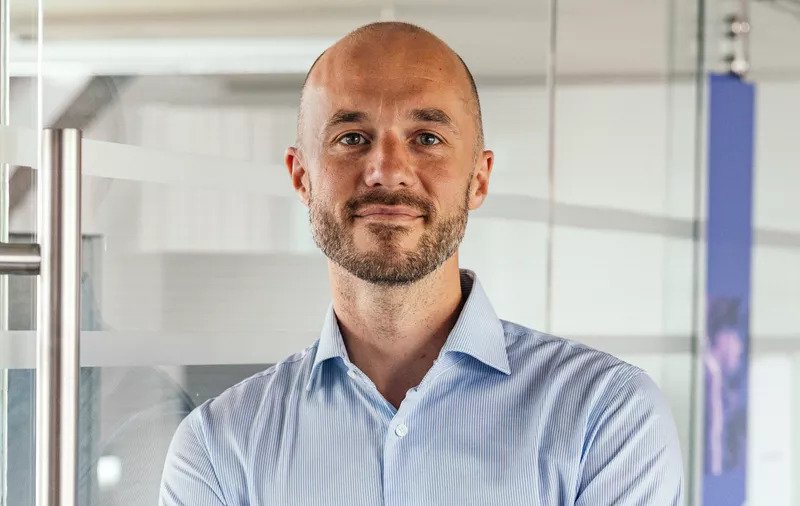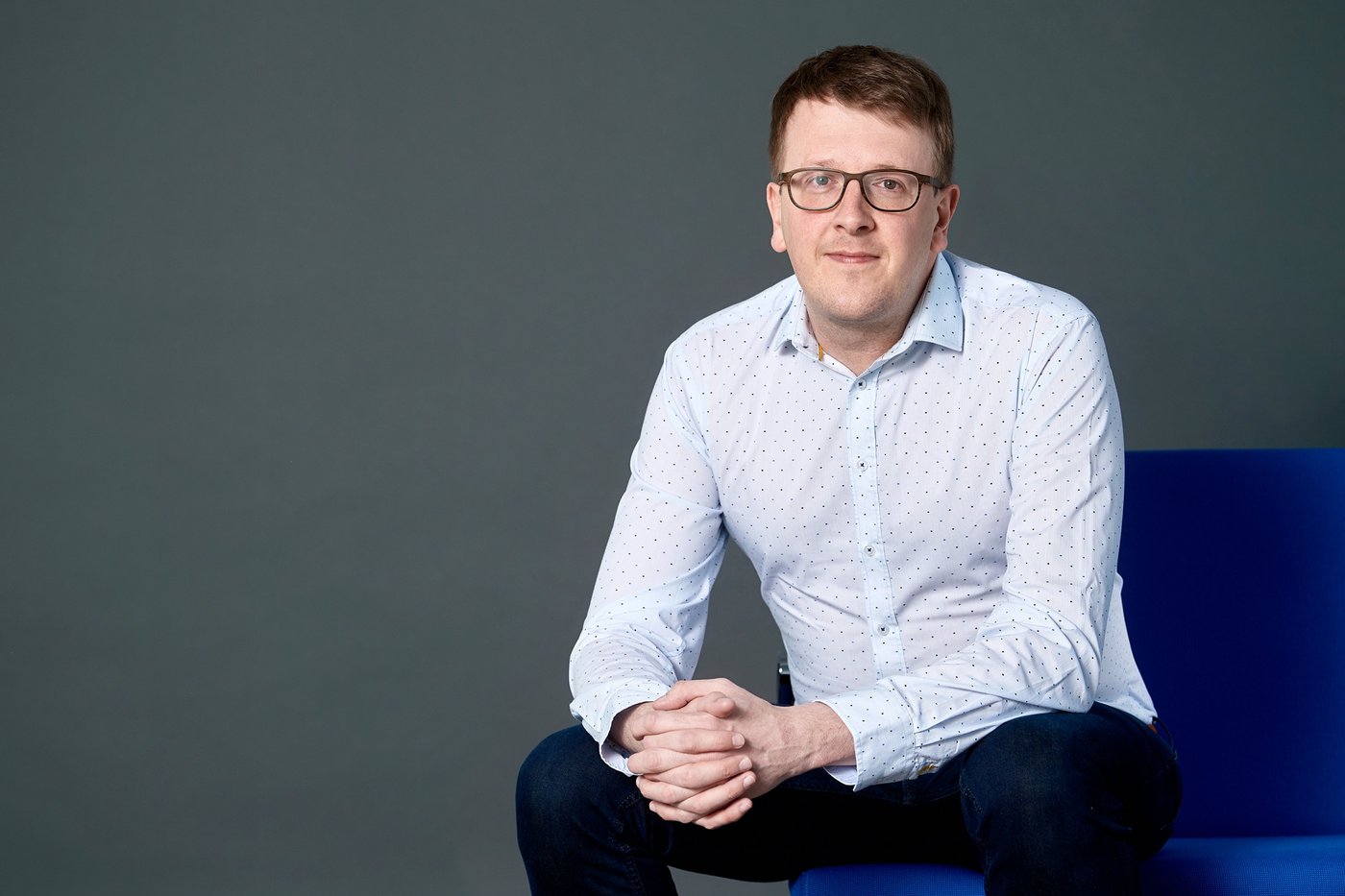'Little children, little worries, big children, big worries,' says the proverb. It’s a bit like that with companies too. Scale-ups struggle with as many challenges as start-ups. Experts Jonathan Aelterman (Möbius) and Frederik Tibau (Agoria) help scale-ups overcome the obstacles on their way to explosive growth. "Fast-growing scale-ups need to come up with processes and structures without losing the speed and agility of a start-up. That is sometimes balancing on a tightrope."
"A few years ago, I went to a Singularity University conference in San Francisco. I was very strongly impressed by their mission then," says Jonathan Aelterman, expert in business transformation and growth at consultancy firm Möbius. "They help and inspire companies to impact at least 1 billion people with new technology. So it's not about valuation, but social impact."
"I also find that drive for impact in many scale-ups. At Möbius, we work for large corporates, but also for young, small companies with big ambitions. The evolution from start-up to grown-up company is inevitably accompanied by growing pains. We use our experience to help scale-ups through that transition."
"The evolution from start-up to grown-up company inevitably involves growing pains. We use our experience to help scale-ups through that transition."
Scaleup Flanders - a partnership of Agoria, Sirris and imec.istart - has set up a mentoring programme for innovative digital scale-ups, explains Frederik Tibau, who draws the programme at Agoria. "These are companies that have already found a product-market fit, have usually already raised some capital and are ready to grow internationally. To grow fast."
"In recent years, the ecosystem of scale-ups in our country, where Möbius and we also play our part, has matured a lot. Although it is important to keep both feet on the ground: Belgian scale-ups are raising more money than ever, but in the countries around us the evolution is even faster."
Best of both worlds: the structures of a corporate, the mindset of a start-up
"When you go from start-up to scale-up, you have to professionalise. You can no longer do without structure and without processes," Aelterman stresses. "That's not the sexiest part of entrepreneurship, but you have to tinker with your operations and your organisation if you want to grow. What is scaling? Doubling or even increasing your turnover tenfold without also multiplying your workforce by two or ten times. You can only achieve that exponential growth by installing or automating processes."
"Scale-ups need processes and structure, but also not too much. They should not become unwieldy."
"We apply our experience at large companies to smaller scale-ups. That is always a bit of balancing on a tightrope. Scale-ups need processes and structure, but also not too much. They should not become unwieldy. They need to maintain their speed and agility, because that is precisely their biggest competitive advantage over corporates that are much larger and have been around for much longer."
"You have to combine the best of both worlds: setting up structures with the creativity of a start-up," Tibau says. "The advantage to processes is that you start introducing standards, working methods and principles. That is necessary when your company has reached a certain size. But you also need to be able to keep moving quickly. If you lose that, you run into trouble."
Van founder naar people manager
"Start-ups and scale-ups are often led by entrepreneurs who have no experience in people management," Tibau continues. "They are creative jack-of-all-trades who build a company from scratch, and do it very well. They tinker with their product, launch new features and negotiate with customers while managing 101 other things outside of that. In the early stages, when you are working with a small team, this is an advantage and even a must. But as your company gets bigger, you need to be able to delegate, organise and coordinate. And then a lot of your time has to go into people management and communication."
"A good and efficient communicator makes sure he keeps the overview and tells a consistent story, without getting lost in side issues. This is important not only to the outside world, but also internally. Scaling up a company is a people business. If you do not have people on board, it will not succeed. And getting everyone on the same page is no mean feat."
"Scaling up a company is a people business. If you do not have people on board, it will not succeed. And getting everyone on the same page is no mean feat."
"There are exceptions, of course, but the best entrepreneurs are often not the best CEOs. They have different roles. You can get mentored and coached as a founder to grow into that role as a people manager and communicator, and there are certainly entrepreneurs who succeed in that transformation. But if they don't succeed, you have to have the courage to recognise that maybe your company needs a different kind of leadership and you need to pass the torch to someone else.

Feel free to stay on board, but in a role that suits you better and where your added value is greater. Beware, this is easier said than done, because your business is much more than just another business: it is your child. Yet, there are fantastic entrepreneurs who quickly pass on the role of CEO in the companies they found and help scale."
"There are different types of entrepreneurs," Aelterman argues. "The founders who shine in the start-up phase are not always the best profiles to further professionalise the company in the scale-up phase. You cannot combine all roles. At some point, you have to choose between an operational role and a strategic-tactical role. The longer you wait to make that choice and switch, the more you stand in the way of your company's growth."
Dare to say no
"We help scale-ups tweak their growth strategy and translate it into their organisation," Aelterman clarifies. "Outlining a growth strategy means above all: daring to focus. Should the customer experience be central? The product? The price? Choose what kind of company you want to be and guard your course. That also means: dare to say no."
"Scale-ups often get into trouble because they start modifying products to the client's needs. They completely change their product for one customer. As a start-up that desperately needs customers, you might still be able to do that. As a scale-up, you cannot turn your business upside down for every new customer. Unless you make the strategic consideration that that one customer can open up a completely new market, but you have to consider that very carefully."

Invest twice as much in sales and marketing compared to product development
"What we also see time and again is scale-ups under-investing in sales and marketing," Tibau picks up. "Our founders often have a technical background, and put everything into R&D and product development. With sales and marketing, they are less in touch."
"Pursuing that perfect product is something distinctively Belgian, it's in our genes."
"Pursuing that perfect product is something distinctively Belgian, it's in our genes. But if you wait too long to enter international markets, your competitors - who may have a lesser product - will steal your thunder. It's a golden rule that a scale-up should invest twice as much in sales and marketing compared to product development."
Internationalisation hinges on the right profiles
"Scale-ups are born globals, which need to become active beyond national borders as soon as possible to scale," Tibau knows. "But internationalising remains difficult. You can't simply copy what works in Belgium to a radically different and much larger market. Every market is different: there are cultural differences, new competitors emerge, regulations differ... It's extremely important that you get the right people on board. Internationalisation hinges on having the right profiles. Working with local people, who know their market like the back of their hand, is preferable."
"Talent is scarce. Scale-ups must capitalise on an authentic and attractive purpose and formulate attractive working conditions that fully encourage entrepreneurship."
"Belgian scale-ups have a bit of a handicap there," says Aelterman. "Talent is scarce, and in other markets such talent is more likely to work for better-known names from bigger markets than for a Belgian scale-up. This therefore requires you to fully capitalise on an authentic and attractive purpose as well as formulate attractive employment conditions that fully stimulate entrepreneurship."
"Additionally, you can also look at the benefits of acquisitions, franchising ... but then you have the difficulty of a cultural fit. It will take some searching for the right formula. That can also vary from market to market."
Successful examples inspire
"Start-ups and scale-ups need inspiring examples, these push an ecosystem forward," Tibau believes. "Don't underestimate what companies like Collibra, Odoo, Deliverect and team.blue bring about. A lot of 'second generation' entrepreneurs are also joining us now, turbocharging our ecosystem. They are sharing their experiences, investing and also founding new companies themselves. The founders of Deliverect had already written a success story with Posios and took that experience to their new company, which they are now growing particularly fast."
"That speed remains crucial, as scale-ups operate in a first-to-scale environment. Companies that receive the most capital are therefore the best armed on the global battlefield. A few years ago in Belgium, with Take Eat Easy - founded by the entrepreneurs behind Brussels e-bike manufacturer Cowboy - we had a scale-up that was in a strong position to grow into a Deliveroo or an Uber Eats. But the Brussel-based meal delivery company was eventually blown away by the hundreds of millions its competitors were able to raise to scale faster."
This article is a collaboration between Bloovi Studio & Möbius. The original article can be found here.



